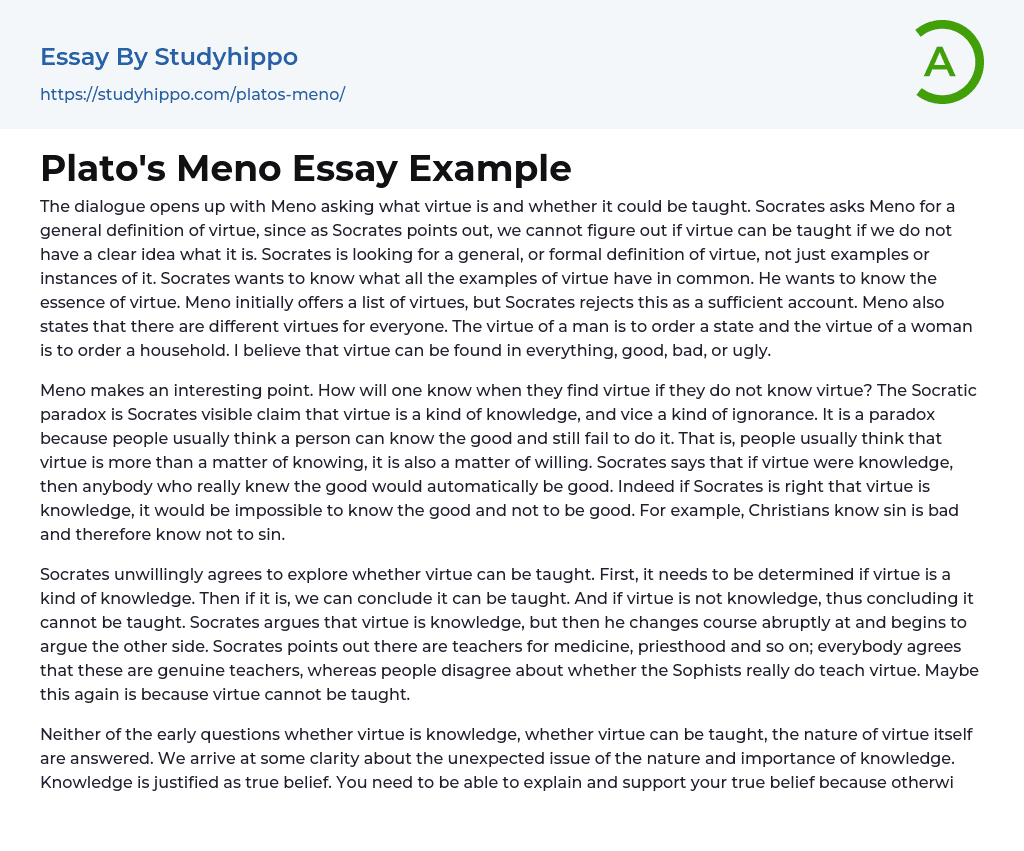The dialogue opens up with Meno asking what virtue is and whether it could be taught. Socrates asks Meno for a general definition of virtue, since as Socrates points out, we cannot figure out if virtue can be taught if we do not have a clear idea what it is. Socrates is looking for a general, or formal definition of virtue, not just examples or instances of it. Socrates wants to know what all the examples of virtue have in common. He wants to know the essence of virtue. Meno initially offers a list of virtues, but Socrates rejects this as a sufficient account. Meno also states that there are different virtues for everyone. The virtue of a man is to order a state and the virtue of a woman is to order a household. I believe that v
...irtue can be found in everything, good, bad, or ugly.
Meno makes an interesting point. How will one know when they find virtue if they do not know virtue? The Socratic paradox is Socrates visible claim that virtue is a kind of knowledge, and vice a kind of ignorance. It is a paradox because people usually think a person can know the good and still fail to do it. That is, people usually think that virtue is more than a matter of knowing, it is also a matter of willing. Socrates says that if virtue were knowledge, then anybody who really knew the good would automatically be good. Indeed if Socrates is right that virtue is knowledge, it would be impossible to know the good and not to be good. For example, Christians know sin is bad
and therefore know not to sin.
Socrates unwillingly agrees to explore whether virtue can be taught. First, it needs to be determined if virtue is a kind of knowledge. Then if it is, we can conclude it can be taught. And if virtue is not knowledge, thus concluding it cannot be taught. Socrates argues that virtue is knowledge, but then he changes course abruptly at and begins to argue the other side. Socrates points out there are teachers for medicine, priesthood and so on; everybody agrees that these are genuine teachers, whereas people disagree about whether the Sophists really do teach virtue. Maybe this again is because virtue cannot be taught.
Neither of the early questions whether virtue is knowledge, whether virtue can be taught, the nature of virtue itself are answered. We arrive at some clarity about the unexpected issue of the nature and importance of knowledge. Knowledge is justified as true belief. You need to be able to explain and support your true belief because otherwise this knowledge will escape form the mind. Socrates uses the slave boy to demonstrate the process of recollection by asking him questions about a geometrical problem. Socrates has shown that there exists an additional cognitive state that can guide one much in the same way as one guided by knowledge. This state is the state of true opinion. Although true opinion is always true, it is fleeting and impermanent.
I believe virtue is anything that may be advantageous in ones own way. It may be good, it may be bad in different peoples perspectives. Unlike, Plato I believe that virtue may be bad as long as it brings
satisfaction to the people who want that type of virtuosity. Virtue may be interpreted many different ways depending on the individual. Some people ideally wish to be bad and may be virtuous in there own sense, even if it is in a bad way. If you place a high value to be bad then you could be virtuously bad. How could that be you ask? If one wishes to be bad that does not mean that they still cannot be virtuous. They will be virtuous in there own way, whichever way they choose good or bad.
I agree with Plato and conclude that virtue may not be taught. How is one to be a scholar of virtue if there are no teachers of virtue? One may learn various types of virtue by observing other people in different situations. Only then may one acquire virtue as he or she interprets it. This may be either a good or a bad virtue depending on the individual and how they interpret it.If being a bad virtuous will make an individual ultimately happy, I believe one should continue with it. There are no teachers of virtue and therefore it cannot be taught. One may learn a virtuous act form someone by observing him or her in a particular situation, but by no means are those someones teachers of virtue. Virtue is acquired through experience and one cannot be born virtuous. It is impossible for a child who cannot pronounce mama to be virtuous.
Words
/ Pages : 848 / 24
- Child essays
- Childcare essays
- Child labor essays
- Doll essays
- Animals essays
- Charles Darwin essays
- Agriculture essays
- Archaeology essays
- Moon essays
- Space Exploration essays
- Sun essays
- Universe essays
- Birds essays
- Horse essays
- Bear essays
- Butterfly essays
- Cat essays
- Dolphin essays
- Monkey essays
- Tiger essays
- Whale essays
- Lion essays
- Elephant essays
- Mythology essays
- Time Travel essays
- Discovery essays
- Thomas Edison essays
- Linguistics essays
- Journal essays
- Chemistry essays
- Biology essays
- Physics essays
- Seismology essays
- Reaction Rate essays
- Roman Numerals essays
- Scientific Method essays
- Mineralogy essays
- Plate Tectonics essays
- Logic essays
- Genetics essays
- Albert einstein essays
- Stars essays
- Venus essays
- Mars essays
- Evolution essays
- Human Evolution essays
- Noam Chomsky essays
- Methodology essays
- Eli Whitney essays
- Fish essays




